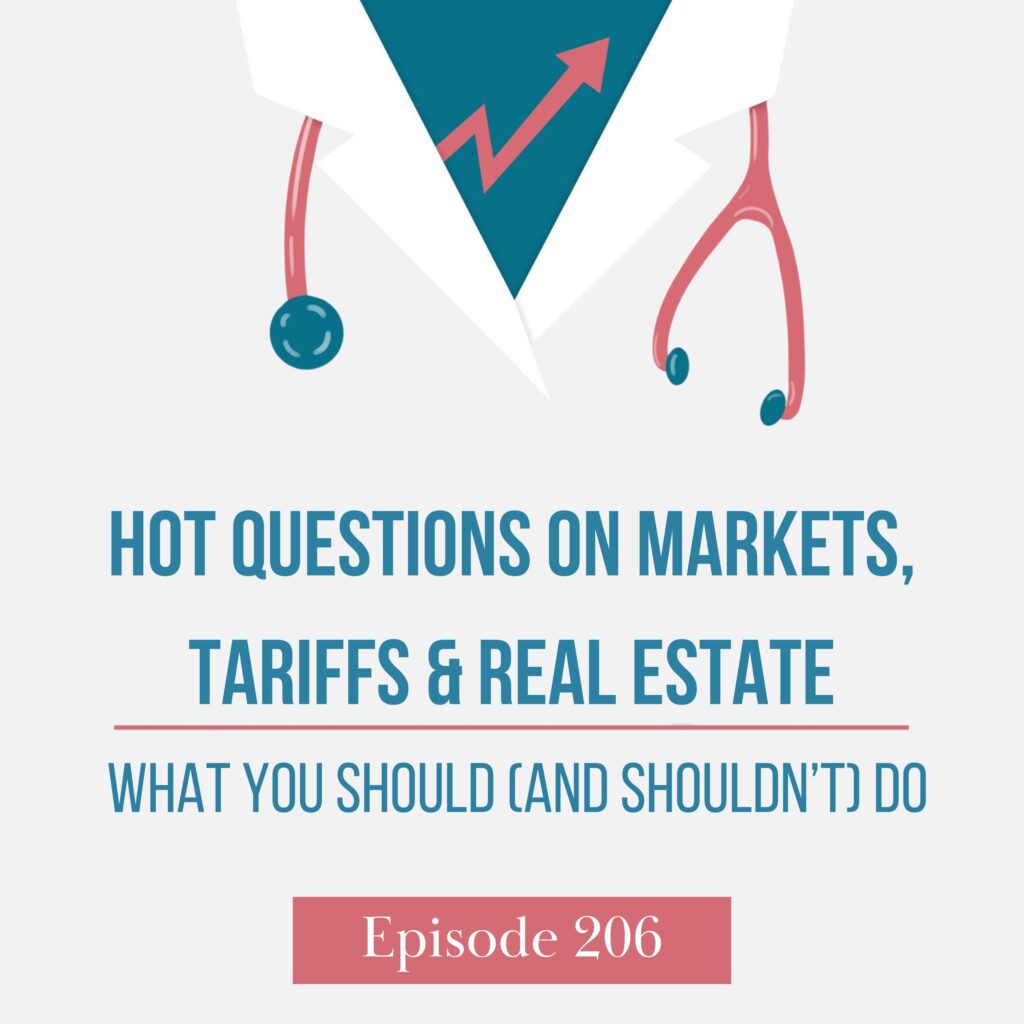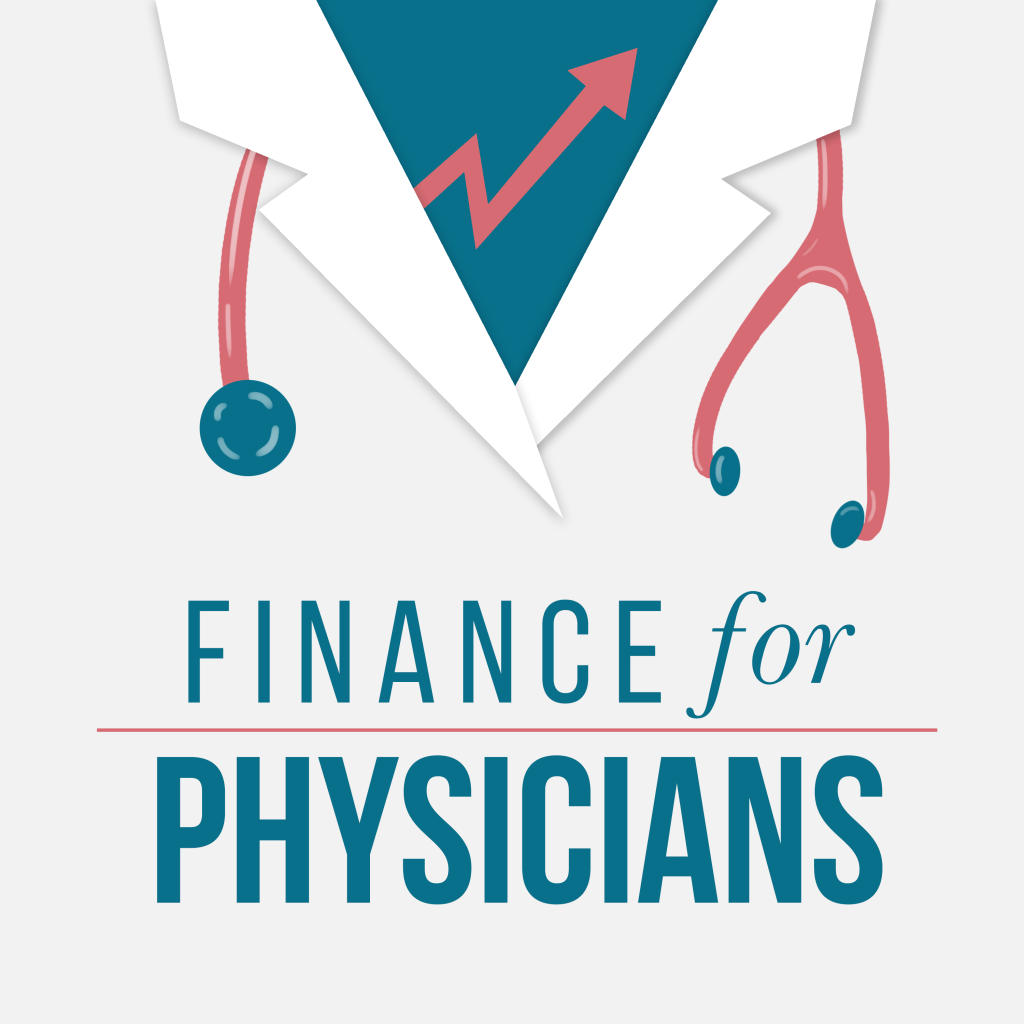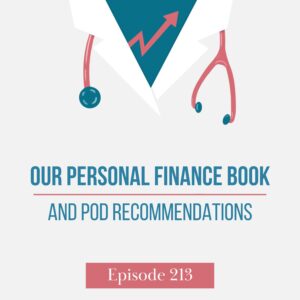When the headlines are full of uncertainty, it’s natural to wonder if you should change your investment strategy.
Tariffs, market swings, the allure of real estate… many physicians are asking the same big questions:
- “How will tariffs affect my investments?”
- “Should I pause my regular contributions until things calm down?”
- “Is buying real estate a good way to diversify?”
In this episode, Daniel and Jennifer Quire dig into these hot topics and share why reacting to short-term changes often backfires.
You’ll learn how fear drives bad decisions, why staying the course is so important, and why real estate may not provide the diversification most people expect.
Listen in if you’ve ever been tempted to “do something” when markets feel shaky, and let this conversation help you gain clarity and stick to a plan that works for the long term.
—————————————————————————————————————————
Transform your financial outlook today! Access our exclusive free resources for physicians and conquer financial stress. Access here. P.S. We value your opinion! Share your thoughts and insights with us. Your feedback helps us improve and tailor our content to your needs. Click here to give us a piece of your mind.
Links
- Episode 198: Buying vs. Renting: What We Wish More Physicians Knew
- Connect with Jennifer Quire
- Connect with me on my LinkedIn
- Contact Finance for Physicians
- Finance for Physicians
- To schedule a call with one of our awesome planners, book HERE.
Full Episode Transcript:
Daniel Wrenne: The problem with looking at the past is everybody always thinks they’re smarter than they actually were. Or you have this, what do they call it, the bias—recency bias—I think is what it is.
Jennifer Quire: April is actually a really interesting example of this. If you go back and look at April, things were pretty normal at the beginning. Then all this tariff stuff came out and it went down, and then April ended up pretty much exactly the same place.
Daniel Wrenne: It was like down, up blast.
Jennifer Quire: Yeah, that’s why you can’t react to short-term changes is—if we had sold, like when do you get back in, when is it the bottom? Like it’s just it’s too hard to time it.
Welcome to Finance for Physicians, the show where we help physicians like you use money as a tool to live a great life. I’m your host, Daniel Wrenne, and I’ve spent the last decade advising physicians on their personal finances with the mission to help them understand that taking control of their finances now means creating a future where they can practice medicine where, when, and how long they want to.
Daniel Wrenne: What’s going on, Jen?
Jennifer Quire: Oh, hi. Long time no talk.
Daniel Wrenne: We’re back again. Two seconds later. We’ve just been recording a few shows today and and have catching up on some fun news stories. We’re not gonna get into that today if you’ve listened to our—
Jennifer Quire: Go back to the Rent vs Buy podcast and you can—
Daniel Wrenne: Yeah, if you want to hear about what we’re talking, yeah.
Check the Rent versus Buy podcast. It’s a big tangent. But anyway, today we’re gonna be talking about some of the hot questions we’re getting—some of the most popular questions we’re getting lately. I guess a couple of these are like pretty standard. We always tend to hear them, but the first two that for sure are, I guess, market economy politics-dependent…
Jennifer Quire: All good stuff.
Daniel Wrenne: So anyway, you wanna throw out the first question, or you want me to?
Jennifer Quire: I don’t remember what it was.
Daniel Wrenne: Oh, then I’ll handle the first. And it’s the one I proposed. And it’s because I’ve gotten this question at minimum a thousand times. Literally.
And the question is, how will the tariffs affect my investments?
Jennifer Quire: Yeah.
Daniel Wrenne: And the answer, Jen gave the answer already. What’s the answer?
Jennifer Quire: I don’t know.
Daniel Wrenne: And I tell people that it—a lot of times they come up with like social stuff. They’re like, “Oh, what do you think about the tariffs and blah blah, and how’s it gonna—what should I do?”
And I’m like, “I don’t know.” And they’re like, “What?”
Jennifer Quire: “What do you mean you don’t know?”
Daniel Wrenne: A little disappointing, but we’ll give you a little more context. That is the accurate way to look at it. The problem is we really don’t know. It’s short term. There’s too many things that have yet to play out. Like, I guess you can look, there’s two different sides.
This is a political thing too, so—
Jennifer Quire: I’ll try to stay outta that part.
Daniel Wrenne: I’ll try to be in the middle, but there’s one side of the political sphere that would argue that it’s a negotiation tactic, and it’s gonna allow some of the bigger goals to be accomplished faster. And that it doesn’t actually affect prices or inflation, like a lot of the economists say. That’s one side of the equation.
The other side of the equation is that it for sure drives inflation. It hurts very quickly. Prices obviously go up because the tariffs have to be paid for and it gets paid for by the consumer and that it’s not a negotiation tactic.
It’s a way to raise taxes indirectly. Those are the two arguments. So the problem is we don’t know which one actually is true. We don’t even know how they’re gonna—the overall strategy. You know how our current president is about changing course. He’s a little bit all over the place. I think both sides would agree with that.
And so you just don’t know. You don’t even know what the strategy is exactly. And we could find economists to argue both sides. So it’s like a lot of these big things. You don’t know early on how it’s actually gonna play out.
Jennifer Quire: Yeah.
Daniel Wrenne: But people—
Jennifer Quire: Is it gonna stick? Is this a bluff? We don’t know.
Daniel Wrenne: Is it a bluff?
Is it actually a negotiation tool? We don’t even know what we’re dealing with, first of all. But then people will be like “when it happened the other time, and they’ll be like, back when it happened in 2016 with the weather, whatever thing that happened. We knew then, and I remember thinking I needed to change my investments then, and I didn’t just ’cause I—”
The problem with looking at the past is everybody always thinks they’re smarter than they actually were, or you have this, what do they call it, the bias—recency bias—I think is what it’s called.
Jennifer Quire: April is actually a really interesting example of this. If you go back and look at April, things were pretty normal at the beginning. Then all this tariff stuff came out and it went down, and then April ended up pretty much exactly the same place.
Daniel Wrenne: It was like down, up, fast.
Jennifer Quire: Yeah. And that’s why you can’t react to short-term changes is— if we had sold, like, when do you get back in, when is it the bottom? Like it’s just too hard to time it
Daniel Wrenne: Right. And if I look at the volume of all the questions I’ve gotten on this particular question, it’s these tariffs, I gotta get out. I gotta do something different. Had all those—the time that the questions were at the highest, the market was starting to fall and getting further down.
And so if people, maybe they got lucky, I don’t know—not many people were asking me that question before it started to fall. It was like when they started to see a little or hear about it more is when the questions really ramped up. And so I would bet that a lot of people that actually acted on that would have gotten made a change after it had gone down potentially substantially, and then right now, post all that, they would be like paralyzed about what they do next.
Jennifer Quire: Yeah because now they wanna get back in, and it’s back up.
Daniel Wrenne: It would’ve bounced back up so fast that they would’ve been like, “Whoa, I didn’t expect that exactly.” But then they would’ve been like, oh, it’s a minor blip, it’s gonna go back down. It’s just gotta kick in. And so now you’re in this bad spot of like—
Jennifer Quire: Analysis paralysis spiral.
Daniel Wrenne: There’s never a good time to get back in and it’s a tough spot. So I’ve come across people many times that are holding cash from like 2000, 2007 because they did something like that, and they’re like, “I just never want—“
Jennifer Quire: “I’m just waiting for the right time.”
Daniel Wrenne: Oh, okay.
Jennifer Quire: And I think those are always good opportunities to just throw some education in there for people. There’s always a tariff thing. If it’s not tariffs, it’s COVID. If it’s not COVID, it’s the financial. If it’s not that, there’s always something to be scared.
And fear sells, like it’s gonna be in the—they wanna scare you.
Daniel Wrenne: Right. And the other thing is it’s always unique. Like they’re always the smart—these people were like, say, “the tariffs are blowing everything up and this time is different than any time ever before.”
Jennifer Quire: “It’ll never be the same.”
Daniel Wrenne: “This is a unique time.” And that’s actually partly true. Whatever flavor of it is definitely unique. But the fact of this kind of thing happening is completely not. It happens all the time. There’s always a new thing.
Jennifer Quire: They hope to scare you. ’cause if they’re like, “Hey, everything’s gonna be fine,” you’re gonna stop watching the news.
Like they have to.
Daniel Wrenne: That’s very boring.
Jennifer Quire: Yeah. They have to get your interest up.
Daniel Wrenne: Okay. That was a long-winded way to say we have no idea.
Jennifer Quire: We don’t know.
Daniel Wrenne: Which is why you should not do anything. Talk to your financial advisor for a specific kind advice.
Jennifer Quire: Call us, email us, we’ll talk to you.
Daniel Wrenne: Yeah, but really, at the end of the day, we don’t know.
AD BREAK
Daniel Wrenne: Let’s take a quick break to talk about our firm, Wrenne Financial Planning.
The goal of our podcast is to empower you to make better financial decisions, but sometimes the best financial decision you can make is to work with someone who understands your financial goals and has the expertise to keep you on track to reach them. That’s where Wrenne Financial Planning comes in. We are a full-service financial planning firm that works with over 400 physicians and their families across the country.
We charge a transparent monthly flat fee for our services and offer virtual meetings you can take from anywhere. Best of all, you’ll get to work with a team that specializes in working with physician families. So whether you’re starting out and wondering how you’ll balance your student loan payments and saving for a home, or you are established physician trying to figure out how to pay for your kids’ college and how much you need to save to reach financial freedom, we can help.
I’ll put a link in the show notes to schedule a no-obligation meeting with one of our certified financial planners. Wrenne Financial Planning, LLC is a registered investment advisor. For more information about our firm, please visit wrennefinancial.com. That’s W-R-E-N-N-E financial.com.
AD BREAK END
Daniel Wrenne: Next question along the same lines, and I think these are interrelated, and this is why we’ve been getting this question, I think more often is secondary to that first point we brought up was, should I stop investing regularly due to all this uncertainty?
So that’s kinda like a baby step in doing something.
Jennifer Quire: Yeah. I want to—there’s this chart that I’m picturing in my mind right now it’s kind of like—what’s the word for that symbol? Like a approximately symbol or whatever. If you’re gonna say something—
Daniel Wrenne: Sideways S?
Jennifer Quire: Yeah. Yeah. I don’t know what that’s called, but there’s a chart that looks like that, and it’s a representation of investing behavior. So if you can picture the sideways S right here, when the market’s high, everyone’s super excited about investing, and then it goes down to the other side of the S, and then no one wants to invest down here. Really, it’s the opposite. You should be the most excited to invest when the market’s down and scared to invest when it’s up, but people’s mindset is actually different.
Daniel Wrenne: I found a version of it online. I just Googled real quick. It’s like when it’s going up, it’s like hopeful, excited, ecstatic, and then it’s like nervous as it starts to go down, it’s nervous, desperate, panic, and panic is at the very bottom, and then it starts to go back up again.
And it’s like doubting, hopeful. So it’s basically like reverse psychology is like—
Jennifer Quire: And it repeats itself over and over and over. And because we can’t point to the highs and the lows, write it out. Like we can’t pick the highs and the lows. That also makes me think of that there was a study done on people whose portfolios had performed the best over a 30-year time period or something. Yeah. And it was people who forgot they had 401(k)s because they just didn’t touch them.
Daniel Wrenne: Yeah.
Jennifer Quire: It was like the classic buy hold.
Daniel Wrenne: Yeah. I guess that’s not really surprising. It’s the ones that are tinkering with it.
It’s, yes, exactly. Danger zone. So I think the easy answer to—if all that you’re asking is, should I stop regularly investing due to market uncertainty? If that’s the only thing that you’re considering and everything else has stayed the same from before, like as in you’re still in a good position to be able to invest, and it makes a lot of sense in your planning, then definitely no, like that’s, it’s not, ’cause essentially that’s trying to time the market basically.
Essentially, that is a smaller version of timing the market, like the aggressive timing the market would be like, “I’m getting outta the market. I’m skidding, I’m changing all my investments due to all this tariff uncertainty, whatever.”
But stopping investing your regular monthly or however often you invest contributions is like dipping your toe in the market timing world.
Jennifer Quire: And I think the key to that is to back up and say you should have a plan that has you investing in a way that accounts for these things, like where you should be investing in a way that a short-term dip isn’t going to change the trajectory of your airplane.
Daniel Wrenne: And a good example of that, I’m gonna go on a little tangent here. Reign me in if you need to, Jen, but international versus US. So we have like preach, advocate, the passive approach, which the ultimate passive is like you’re basically investing how the world market invests.
Or how the world market is capitalized. So the size of the world market, you’re spreading it out all over the place. And so the ultimate diversification is to have lots of different stocks all over the world. And so right now, for example, where that comes into play is when certain sectors or certain even regions have trouble.
So the tariffs were a good example. I think some of the—like over that period of time when people got freaked out about it, the US economy or the US stocks really got hit, especially small US stocks, they went down a lot versus international, not near as much.
And then in particular, I think certain industries went down even further as a result of that. So comparing that to international—international has actually done pretty well even now. I think to this day, even though stuff’s recovered in the US, I think international is looking really good relative to the US over the, at least year to date or whatever time period, and that shit, I don’t know, like we were saying, we don’t know what’s gonna play out.
Like we don’t know what the economy’s actually gonna look like. A lot of this is hype, but it does make sense that the international stocks would be doing better over a period of time where there’s a ton of uncertainty in the US, and the key though is you own both, and so you’re diversified to the point where these volatile time periods are less of an issue for you.
Jennifer Quire: Yeah. Yeah. I don’t know, I’m picturing that quilt, that asset class quilt in my head right now where—
Daniel Wrenne: You’re very visual today.
Jennifer Quire: I am because I got this whole boat thing in my head.
Daniel Wrenne: If you want to see the quilt, Google “asset allocation quilt” or “investment quilt.” It’s pretty cool visual of what I was just talking about.
Jennifer Quire: Each asset class has its time in the sun, but we don’t know when that’s gonna be. Like there’s no pattern to it. Like you look at that quilt, it’s very irregular. So it’s rather than trying to be like, “Okay, I bet in two years from now it’s gonna be small caps, time in the sun,” you say, “I’m just gonna hold everything in relation to this total market and then I don’t have to play the timing game.”
Daniel Wrenne: Right. And then the other thing about the investing regularly, that’s big time psychologically. Habit-form wise, it is very good to have developed that habit. And it’s hard sometimes, especially certain people, everybody’s different. Some people struggle with it more than others, but it’s like going to the gym or eating healthy.
If you’re in the habit of going to the gym, it’s like autopilot. You don’t even think about it. In fact, you get a little concerned if you’re not going ’cause you’re like I gotta do the thing. But if you’re not going to the gym at all, getting in the habit of it is just very difficult.
So the same thing, it’s similar, like investing regularly. People that invest regularly, like on autopilot, they don’t think about it. It’s just like automatic. And if they turn it off, then they have to go through this whole psychological exercise of getting back in the habit and convincing themselves it makes sense. And so that, that’s another downside of turning it off is you have to—
Jennifer Quire: Habit building.
Daniel Wrenne: Yeah. So ideally you just keep the thing going and not worry about these hyped up short term. I guess it could be long-term, we don’t know, but—
Jennifer Quire: Please talk to your advisor.
Daniel Wrenne: So last question. Speaking of diversification, we did talk a little bit about diversification.
One of the questions that comes up a lot, I’m sure you’ve gotten this question, Jen, right?
Jennifer Quire: Yep. A lot.
Daniel Wrenne: Real estate is—I think the way it comes up normally is “I’m going to invest in real estate.”
Jennifer Quire: “I don’t want all my eggs in the market. I don’t want all of my wealth building to be in the market. I wanna diversify.”
Daniel Wrenne: Right. “I’d like to diversify. I feel like I got all my eggs in the market basket, and so I’d like to diversify into real estate.” Typically, what people are talking about there is real estate as in either buying a rental property or a syndication or a deal or whatever locally, usually, or sometimes not locally, but that’s generally what I think what people are talking about.
I think the question what I would be asking instead of how we positioned it, I would pose the question to Jen, is that type of real estate investment good for diversification?
Jennifer Quire: Typically, I would say no, not just for the idea of is this going to hedge against what my portfolio’s doing? Is it gonna act inversely or anything to that?
But also just the amount of money that you typically have to put into a rental property relative to how much you have invested. Usually you’re concentrating a risk quite a bit.
Daniel Wrenne: Right. So in reality, it’s the opposite of diversification. It’s concentration. So the other thing too is. You probably own real estate already, and you may or may not realize it.
So if you—
Jennifer Quire: Most likely do.
Daniel Wrenne: If you’re with us or even any big, most 401(k)s have real estate funds. And even if you don’t have real estate fund, if you own the Vanguard Total Stock Market, a little sliver of the pie is real estate.
But if you own like the Vanguard Real Estate Index, for example, it’s investing in all the kinds of different real estate all over the country. Every different flavor of the real estate market you can think of it’s investing in. And it’s spread out everywhere. So that’s like the ultimate of diversification. And so if that’s actually the number one focus is diversification, then just buy some Vanguard Total stock market and it’s ultra diversified.
Okay, in summary, our answers are, “I don’t know,” “no,” and “no.”
Jennifer Quire: “I don’t know,” “no,” and “definitely no.”
Daniel Wrenne: Definitely no. So don’t worry about the tariffs yet. Let’s see how it plays out. Definitely don’t go change in your investments because of that. Stay the course with your automatic investments. Unless something’s changed in your circumstances, that’s different.
Jennifer Quire: And please let us know.
Daniel Wrenne: Yes. If you’re working with us, let us know. Even if you’re not working with us, we’re happy to answer questions and that kind of thing. We’re not gonna give specific advice because you should consult your—I’m throwing out disclaimers.
Consult your tax and financial advisors for advice specific to your circumstances. And then real estate is typically in the context we raise. Not good for diversification. There’s other good reason—I don’t wanna poo on real estate too much. There are other good reasons to do it.
Diversification is not one. Yeah. Yeah. All right. We almost got done on time. We said we’re gonna do 20 minutes. So we’re pretty close, so we can call to wrap at that. Jen, I’ve enjoyed going through these questions today, and thank you for your input.
Jennifer Quire: You’re welcome.
Daniel Wrenne: We’ll talk to you soon.
No guests or clients appearing on the podcast received any form of compensation for their appearance and obtained no other benefit from us. It should not be assumed that every client has had the same experience.









